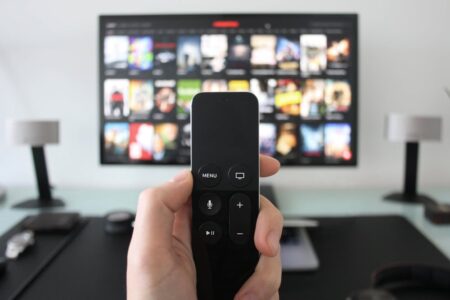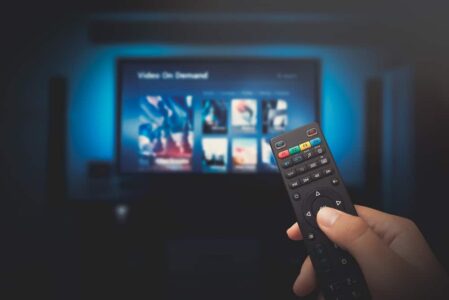Jasmine Birtles
Your money-making expert. Financial journalist, TV and radio personality.

The UK’s main TV broadcasters are launching Freely: a new digital service to take on streaming giants like Netflix and try and plug dwindling viewing figures.
Britain’s public sector broadcasters, including the BBC, ITV and Channel 4, have developed a platform to deliver live TV over broadband, ending the need for an aerial to access freely available channels.
Called Freely, the service will be built into the next generation of smart TVs, in effect taking the Freeview platform on to the internet.
It means Britain’s viewers will be able to watch live TV channels alongside on-demand content streamed to smart televisions via the internet. At the moment audiences can watch live tv over the internet through broadcasters’ individual apps, but there is no electronic programme guide access.
Live TV delivers more than half of all viewing in the UK according to statistics from Barb, (Broadcasters’ Audience Research Board) and the BBC’s director-general Tim Davie admits ‘ensuring the universality of public service television is sustained into the future is of paramount importance to the UK and its public service broadcasters’.
However Ofcom, the broadcasting watchdog, recently revealed in it’s annual report that Traditional TV viewing in the UK has seen its sharpest ever decline over the past year.
The number of people tuning in each week was down from 83% in 2021 to 79% in 2022 and older audiences, who might once have been considered the stalwarts of TV audiences, are switching off at the fastest rate, with many of them taking up streaming services.

Freely is being developed by Everyone TV, the organisation that runs free TV in the UK and is jointly owned by the BBC, ITV, Channel 4 and Channel 5.
Jonathan Thompson, Everyone TV’s chief executive said: ‘Freely is a reflection of the fact that a growing number of UK viewers are watching content online, but still want easy access to the shared experience of live TV’.
He added that about 15 per cent of homes did not plug their TVs into the aerial – preferring to use broadband to watch apps such as Netflix and iPlayer, but that this number was expected to increase to 50 per cent by the end of the decade.
‘In essence, we’re filling the gap. We’re offering a service to manufacturers which they will embed into their TV so when you go to live tv, you’ll get a very familiar, aggregated experience but streamed over the internet’.
Nevertheless, long-term trends show traditional viewing forms are declining over time. Children and young adults’ average daily broadcast viewing has fallen by 73 per cent since 2012.
Now they prefer to spend an hour a day on the social media platform Tik Tok, consuming ‘snackable’ short form content.
 Ofcom admitted that the UK’s media diet was more ‘diverse and fragmented than ever’.
Ofcom admitted that the UK’s media diet was more ‘diverse and fragmented than ever’.
The growing popularity of large tech groups and streaming platforms like Netflix, which gained 54 million new subscribers during lockdown, and Amazon, has seen a considerable shift away from traditional TV viewing in this country.
Broadcast executives are concerned that next generation TVs will prioritise these streaming services over freely available channels when viewers first switch on their sets.
The government has responded by proposing new rules in the forthcoming media bill, designed to ensure these public channels are given prominence on digital TVs.
Alex Mahon, Channel 4’s CEO says: ‘Streaming TV is increasingly the new normal for audiences, particularly younger viewers, so it’s never been more important for trusted PSB content to be readily available for everyone, for free.
‘We look forward to working closely with our PBS partners so that the technology to make Britain’s favourite TV shows easy to find will already be in place’.
The BBC is Britain’s biggest PBS but there has been growing anger about why we should pay an annual £159 licence fee and that audiences should be able to choose what channels they want to pay for.
A report earlier this year revealed that the number of active licenses had fallen by 500,000 to 24.4 million since last year. It is clear evidence about the growing unwillingness to pay and a general view that the licence fee model is unsustainable.

And in August it was revealed 2.84 million insist they are no longer obliged to fork out the licence fee because they don’t watch BBC channels or any kind of live TV.
And the estimated evasion rate, being driven by the cost of living crisis, has increased to over ten per cent for the first time since 1995, costing the BBC £430 million annually.
The BBCs royal charter, which sets out the corporation’s mission, purpose and funding model, is up for renewal in 2027.
A review of BBC funding is expected to look at a partial subscription idea where some premium content is paid for, while the bulk of their output remains free to air.
Another problem facing our broadcasters is that cash-strapped household have realised they can do a lot of what they like to watch on their mobile devices.
Tik Tok and Instagram are designed for smaller screens and the world is moving away from fixed devices and static TVs in the living room which has always traditionally placed the BBC at the top of the menu.
Freely may be a step in the right direction for all of our PBS services because if they don’t start to compete more effectively in our digital led world, they may fade from view completely.
It is expected that the service will be introduced from next year although it won’t be available on older sets.
Where to legally watch films for free
Save money on Netflix and other streaming services
